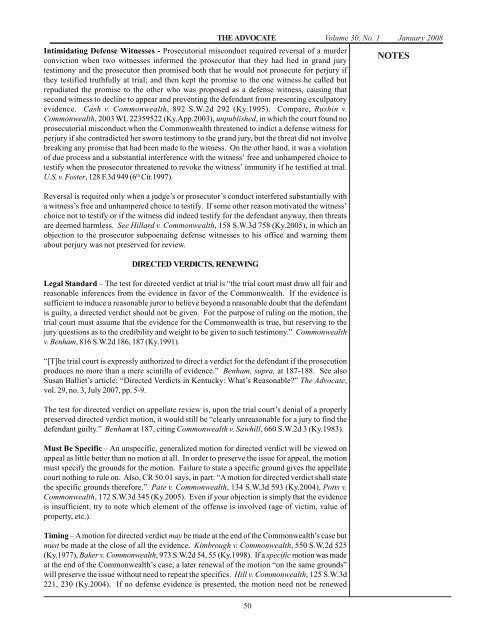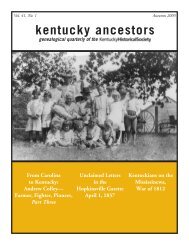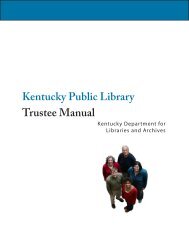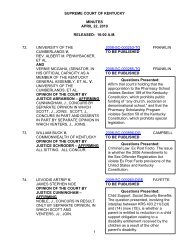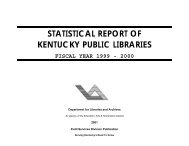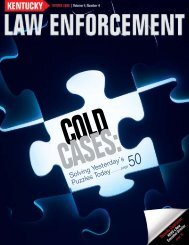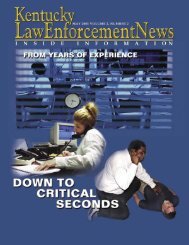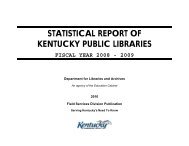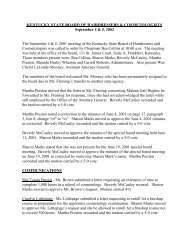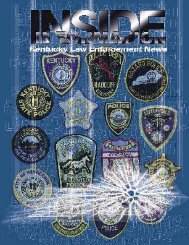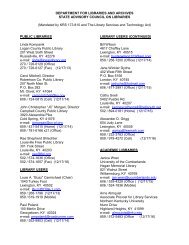Jan08 Advo.pmd - e-archives Home
Jan08 Advo.pmd - e-archives Home
Jan08 Advo.pmd - e-archives Home
Create successful ePaper yourself
Turn your PDF publications into a flip-book with our unique Google optimized e-Paper software.
THE ADVOCATE Volume 30, No. 1 January 2008<br />
Intimidating Defense Witnesses - Prosecutorial misconduct required reversal of a murder<br />
conviction when two witnesses informed the prosecutor that they had lied in grand jury<br />
testimony and the prosecutor then promised both that he would not prosecute for perjury if<br />
they testified truthfully at trial; and then kept the promise to the one witness he called but<br />
repudiated the promise to the other who was proposed as a defense witness, causing that<br />
second witness to decline to appear and preventing the defendant from presenting exculpatory<br />
evidence. Cash v. Commonwealth, 892 S.W.2d 292 (Ky.1995). Compare, Rushin v.<br />
Commonwealth, 2003 WL 22359522 (Ky.App.2003), unpublished, in which the court found no<br />
prosecutorial misconduct when the Commonwealth threatened to indict a defense witness for<br />
perjury if she contradicted her sworn testimony to the grand jury, but the threat did not involve<br />
breaking any promise that had been made to the witness. On the other hand, it was a violation<br />
of due process and a substantial interference with the witness’ free and unhampered choice to<br />
testify when the prosecutor threatened to revoke the witness’ immunity if he testified at trial.<br />
U.S. v. Foster, 128 F.3d 949 (6 th Cir.1997).<br />
Reversal is required only when a judge’s or prosecutor’s conduct interfered substantially with<br />
a witness’s free and unhampered choice to testify. If some other reason motivated the witness’<br />
choice not to testify or if the witness did indeed testify for the defendant anyway, then threats<br />
are deemed harmless. See Hillard v. Commonwealth, 158 S.W.3d 758 (Ky.2005), in which an<br />
objection to the prosecutor subpoenaing defense witnesses to his office and warning them<br />
about perjury was not preserved for review.<br />
DIRECTED VERDICTS, RENEWING<br />
Legal Standard – The test for directed verdict at trial is “the trial court must draw all fair and<br />
reasonable inferences from the evidence in favor of the Commonwealth. If the evidence is<br />
sufficient to induce a reasonable juror to believe beyond a reasonable doubt that the defendant<br />
is guilty, a directed verdict should not be given. For the purpose of ruling on the motion, the<br />
trial court must assume that the evidence for the Commonwealth is true, but reserving to the<br />
jury questions as to the credibility and weight to be given to such testimony.” Commonwealth<br />
v. Benham, 816 S.W.2d 186, 187 (Ky.1991).<br />
“[T]he trial court is expressly authorized to direct a verdict for the defendant if the prosecution<br />
produces no more than a mere scintilla of evidence.” Benham, supra, at 187-188. See also<br />
Susan Balliet’s article: “Directed Verdicts in Kentucky: What’s Reasonable?” The <strong>Advo</strong>cate,<br />
vol. 29, no. 3, July 2007, pp. 5-9.<br />
The test for directed verdict on appellate review is, upon the trial court’s denial of a properly<br />
preserved directed verdict motion, it would still be “clearly unreasonable for a jury to find the<br />
defendant guilty.” Benham at 187, citing Commonwealth v. Sawhill, 660 S.W.2d 3 (Ky.1983).<br />
Must Be Specific – An unspecific, generalized motion for directed verdict will be viewed on<br />
appeal as little better than no motion at all. In order to preserve the issue for appeal, the motion<br />
must specify the grounds for the motion. Failure to state a specific ground gives the appellate<br />
court nothing to rule on. Also, CR 50.01 says, in part: “A motion for directed verdict shall state<br />
the specific grounds therefore.” Pate v. Commonwealth, 134 S.W.3d 593 (Ky.2004), Potts v.<br />
Commonwealth, 172 S.W.3d 345 (Ky.2005). Even if your objection is simply that the evidence<br />
is insufficient, try to note which element of the offense is involved (age of victim, value of<br />
property, etc.).<br />
Timing – A motion for directed verdict may be made at the end of the Commonwealth’s case but<br />
must be made at the close of all the evidence. Kimbrough v. Commonwealth, 550 S.W.2d 525<br />
(Ky.1977), Baker v. Commonwealth, 973 S.W.2d 54, 55 (Ky.1998). If a specific motion was made<br />
at the end of the Commonwealth’s case, a later renewal of the motion “on the same grounds”<br />
will preserve the issue without need to repeat the specifics. Hill v. Commonwealth, 125 S.W.3d<br />
221, 230 (Ky.2004). If no defense evidence is presented, the motion need not be renewed<br />
50<br />
NOTES


